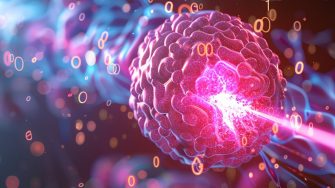Cancer | Drug Discovery |

Our team is dedicated to improving treatments for patients with pancreatic cancer. We have developed a patient-centered drug development pipeline focusing on the unmet clinical challenges faced by patients which include, the heterogeneity of tumours, the scar tissue fortress, and tumour metastasis.
Our research program spans from cell biology discoveries, preclinical development of new therapeutics all the way to a current Phase-2 clinical trial and embedding correlative science into our precision medicine trials program.
Current projects
- Cancer Institute NSW Translational Program Grant supports several active projects including: 1) A Phase-2 clinical trial called SPEAR (Sulfasalazine in patients with PancrEatic AdenocaRcinoma; ACTRN12621001347853); 2) examining spatial transcriptomic profiles of pancreatic tumours and correlating with fibrosis, genomic mutations, cancer-associated fibroblast activity / subtypes; 3) evaluating the use of patient-reported outcomes in predicting survival outcomes and supporting eligibility for clinical trials.
- Development of nanoparticles for therapeutic deliver of RNA therapeutics to pancreatic tumours supported by current NHMRC Ideas grant.
- Development of novel drugs as dual cell therapeutics that target both pancreatic cancer cells and cancer-associated fibroblasts
- Assessing the utility of patient-derived pancreatic tumour explants in predicting drug response in patients supported by PanKind grant.
Read more about our research:
- Scientists show how to attack the 'fortress' surrounding pancreatic cancer tumours (unsw.edu.au)
- Pancreatic cancer clinical trial program to target genome and scar tissue (unsw.edu.au)
- Human pancreatic cancer model offers new opportunities for testing drugs (unsw.edu.au)
- Top UNSW biomedical researcher wins Eisenhower Fellowship
Highlighted publications
- Cancer-Associated Fibroblasts in Pancreatic Ductal Adenocarcinoma Determine Response to SLC7A11 Inhibition - PubMed (nih.gov)
- Ex vivo culture of intact human patient derived pancreatic tumour tissue | Scientific Reports (nature.com)
- A first-in-class pan-lysyl oxidase inhibitor impairs stromal remodeling and enhances gemcitabine response and survival in pancreatic cancer - PubMed (nih.gov)
- Targeting the undruggable in pancreatic cancer using nano-based gene silencing drugs - PubMed (nih.gov)
- Does the Microenvironment Hold the Hidden Key for Functional Precision Medicine in Pancreatic Cancer? - PubMed (nih.gov)
Our experts
Professor Phoebe Phillips - Group Leader
Professor Phoebe Phillips leads the Pancreatic Cancer Translational Research Group and is Associate Dean of Medicine at UNSW, and Deputy Director of Cancer Clinical Academic Group, SPHERE (Sydney Partnership for Health, Education, Research, and Enterprise). She is internationally recognised for her ground-breaking work into pancreatic cancer and has >20 years’ experience in trying to tackle this deadly disease. Her work has focused on understanding the complex cellular and microenvironment interactions in pancreatic cancer. Her research has resulted in several clinical trials (current Phase-2 SPEAR trial she is leading and multiple precision medicine trials) based on results in innovative 3D human tumour models with fully intact microenvironment. Her translational program is supported by several industry partnerships and she is currently funded by NHMRC, NSW Health, Cancer Institute NSW, and PanKind. She was awarded an International Eisenhower Fellowship in 2019 (1/23 global fellows in 2019; 22nd Australian to receive honour since 1953) for leadership in research and health policy change to improve health. In 2022 Prof Phillips was awarded an AM as part of the Queen's Birthday Honours, for significant service to pancreatic cancer research.
Team members
- Dr George Sharbeen (Deputy Lead)
- Dr Keilah Garcia Netto (Post-doc)
- Dr Shannon Chiang (Post-doc)
- Dr Omali Pitiyarachchi (Oncologist + PhD student)
- Dr Aparna Raina (Post-doc)
- Ms Janet Youkhana (Senior Research Officer)
- Ms Grace Schulstad (PhD Student)
Honor students
- Vaishalee Jeyananthan

